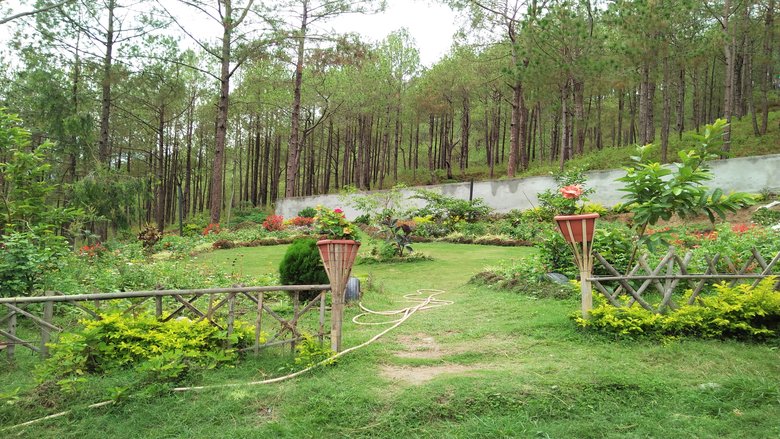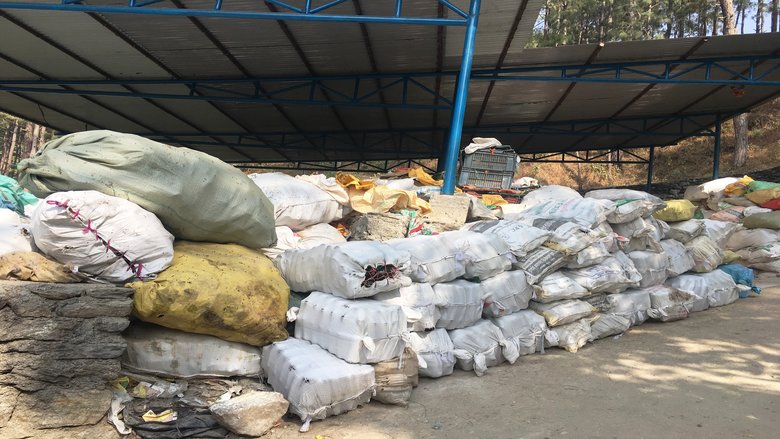As the clock strikes 6 AM, a municipal tractor in Hile, Dhankuta winds its way across town, collecting waste destined to a landfill 13 kilometers downhill. While most Nepali towns still struggle with solid waste problems, Dhankuta has established a well-managed disposal system that even makes money.
In July 2017, Dhankuta was declared the ‘cleanest city’ in the country, bagging the top spot worth NRs. 1,000,000 in an annual contest sponsored by the Government of Nepal’s Solid Waste Management Technical Support Center (SWMTC). Dhankuta was placed second in the contest last year, which awards numbers to municipalities based on their efforts in solid waste management, drainage and sewerage system, greening and beautification.
“We were not particular about cleanliness up until about a decade ago,” says Lal Chandra Gongba Tamang, former President of the Dhankuta chapter of Federation of Nepalese Chamber of Commerce and Industries (FNCCI). “People littered plastic everywhere. That choked our drains and frequently spattered filth on our streets.”
When problems became untenable Dhankuta locals got together to discuss solutions. That was in the year 2009. In the years since, they established a landfill in Salleri, at the foothills of a forest – spread over an area of 30 ropanis (around 642 sq.ft.) at a cost of NRs. 40 million – to handle 10 tons of waste every day for the next 25 years. Then they declared Dhankuta ‘plastic-free’.
Today the municipality is visibly spick-and-span. Garbage cans dot the streets and are emptied regularly. Dhankuta residents consider cleanliness as part of their regular civic duties. The municipality employs 16 sanitation workers, who visit different routes each day to ensure all wards under the municipality are covered. They sweep up public places and street corners every day, while the streets in front of houses and shops are swept clean by owners themselves.

According to a report published by the World Bank in 2015, nearly 700,000 tons of waste is annually generated in Nepal’s cities. Out of this, less than 50 percent is collected, while most of the waste is haphazardly dumped. Although solid waste management can make up to 50 percent of a municipality’s annual budget, many municipalities do not earn any revenue while providing waste management services.
Dhankuta is, then, an exception to the norm. The Dhankuta landfill site occupies the center of this unique model where three tractors tow in waste from 10 wards every morning. While landfills elsewhere battle stench and filth, the Dhankuta municipality has actually designed and built a garden on top of the buried waste. The bouncy garden, carpeted in green and spotted with pretty seasonal flowers, is the pride of the entire municipality. Locals, especially children, entertain themselves at the mini-park, and over 100 groups of outsiders have visited the ‘garden’ to learn how the model might be copied.
When Waste Means Business
Locals now recycle and reuse materials they would earlier have thrown into the garbage. The municipality has trained households to segregate biodegradable and non-biodegradable waste. Most households repurpose biodegradables as manure or cattle feed. This has drastically cut down on the waste. Thus, the landfill load has also eased.
Bechan Sardar, who drives one of the municipal tractors, explains, “People now realize that bio-degradable waste pollutes, hence only around 10 percent of such waste reaches the landfill.”

As the first load arrives, sanitation workers sort through paper, plastic and metal. Then another group reclaims the waste for reuse. The municipality has auctioned off reusables to Kaushal Thapa, a local entrepreneur, for an annual royalty of NRs. 50,000. While this may seem nominal, the enterprise provides regular jobs to nine people, while also producing raw materials for enterprises.
Thapa used to run a scavenging business since a decade ago, with his staff visiting houses to collect waste materials. But once the landfill was established, he realized that this could be a valuable source for his business. “I talked to municipal authorities about working together to reduce waste,” Thapa explains. As per their agreement, Thapa’s staff visit the landfill every day and sort reusable waste, which he sells to enterprises as far away as Dharan, Itahari, Biratnagar and even Jogbani in India. “If five tractors of waste was buried in the landfill site earlier, now barely two tractors is buried each day, and the rest is put to good use. I am satisfied with the profits, and happy that I am helping keep my place clean,” Thapa says.
Last Updated: Nov 02, 2017


